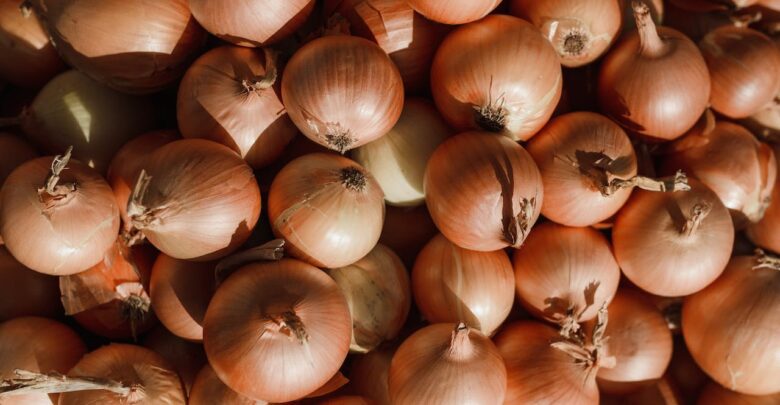From Kitchen Staple to Superfood: Unearthing the Surprising Health Benefits of Onions

The Nutritional Value of Onions
Onions, often regarded as a humble kitchen staple, are powerhouses of essential nutrients. Packed with vitamins, minerals, and antioxidants, onions offer an array of health benefits. These underground bulbs are a rich source of vitamin C, an essential nutrient known for its immune-boosting properties. Additionally, onions contain fiber, folic acid, and potassium, making them a valuable addition to a balanced diet. Their low calorie content and high water composition further contribute to their nutritional value, making them an ideal choice for those seeking to maintain a healthy weight. Discover the numerous health benefits of onions and how they can enhance your well-being.
Furthermore, onions contain organosulfur compounds, which are responsible for their distinct aroma and pungent flavor. These compounds have been linked to various health benefits, including potential anti-cancer properties. The combination of nutrients and bioactive compounds in onions makes them a versatile ingredient that can promote overall well-being and vitality.
Antioxidant Properties of Onions
One of the most remarkable qualities of onions is their potent antioxidant properties. The presence of flavonoids, particularly quercetin, sets onions apart as a natural source of antioxidants. These compounds play a crucial role in combating oxidative stress and reducing the risk of chronic diseases. Quercetin, in particular, has been studied for its anti-inflammatory effects, which may aid in preventing conditions such as heart disease and certain types of cancer.
In addition to quercetin, onions also contain other antioxidants, such as anthocyanins and sulfur compounds, which work synergistically to neutralize free radicals and protect the body from cellular damage. By incorporating onions into your diet, you can harness the protective power of antioxidants, bolstering your body’s defense against oxidative stress and promoting long-term health.
Onions and Heart Health
The consumption of onions has been associated with various cardiovascular benefits, making them a valuable ally in maintaining heart health. The potent combination of antioxidants and anti-inflammatory compounds found in onions can contribute to reducing the risk of heart disease. By helping to lower levels of cholesterol and blood pressure, onions play a role in promoting cardiovascular well-being.
Moreover, the organosulfur compounds in onions have been linked to potential anti-thrombotic effects, which can prevent the formation of blood clots and reduce the risk of stroke and heart attacks. Incorporating onions into your diet can support the health of your cardiovascular system, offering a natural and flavorful approach to heart disease prevention.
Also read: From Zesty Flavor to Wellness Wonder: The Benefits of Lemon
Onions and Digestive Health

In addition to their cardiovascular benefits, onions have a positive impact on digestive health. The fiber content in onions supports healthy digestion and regular bowel movements, aiding in the prevention of constipation and promoting gut health. Furthermore, the presence of prebiotics in onions serves as nourishment for beneficial gut bacteria, contributing to a balanced and thriving gut microbiome.
The anti-inflammatory properties of onions also extend to the digestive system, potentially alleviating symptoms of gastrointestinal discomfort and supporting overall digestive wellness. Whether consumed raw, cooked, or as part of a fermented dish, onions can play a valuable role in maintaining a healthy and resilient digestive tract.
Onions and Immune System Support
Amidst their array of health benefits, onions stand out as potent supporters of the immune system. The high vitamin C content in onions serves as a vital nutrient for immune function, bolstering the body’s defenses against infections and illnesses. Additionally, the presence of antioxidants in onions contributes to reducing inflammation and strengthening immune responses.
Onions also contain compounds with potential antimicrobial properties, which may aid in combating bacterial and viral infections. By incorporating onions into your culinary repertoire, you can fortify your immune system and enhance your body’s ability to ward off common ailments, contributing to your overall well-being.
Onions in Traditional Medicine
The healing properties of onions have been revered for centuries in traditional medicine practices across various cultures. From ancient civilizations to contemporary holistic approaches, onions have been utilized for their medicinal benefits. Traditional remedies often involve using onions to alleviate respiratory conditions, such as coughs and colds, due to their expectorant and antimicrobial properties.
Moreover, onions have been employed topically to promote wound healing and reduce inflammation. Their versatile application in traditional medicine reflects the enduring recognition of their health-enhancing properties. By embracing the wisdom of traditional medicine, we can appreciate the enduring value of onions as a natural remedy for a myriad of health concerns.
Also read: The Incredible Health Benefits of Broccoli: A Nutrient Powerhouse
Incorporating Onions into Your Diet

Incorporating onions into your diet is a simple and flavorful way to reap their numerous health benefits. Whether consumed raw in salads, sautéed in stir-fries, or caramelized in savory dishes, onions add depth of flavor and nutritional value to a wide range of culinary creations. Consider incorporating onions into homemade salsas, soups, and stews to elevate both the taste and nutritional profile of your meals.
Furthermore, pickled onions can serve as a tangy addition to sandwiches and wraps, providing a burst of flavor along with their healthful attributes. Embracing the diverse culinary uses of onions allows you to infuse your diet with their nutritional prowess while enhancing the enjoyment of your meals.
Cooking with Onions: Tips and Recipes
When it comes to cooking with onions, a few essential tips can help you make the most of their unique flavor and nutritional benefits. Start by selecting onions that are firm and free of blemishes, ensuring optimal freshness and flavor. When chopping onions, consider chilling them beforehand to minimize the release of volatile compounds that cause eye irritation.
For a simple and nutritious recipe, consider preparing caramelized onion quinoa. Begin by caramelizing thinly sliced onions in a skillet, then incorporate them into a pot of cooked quinoa for a flavorful and wholesome dish. Additionally, you can experiment with onion-based condiments, such as homemade onion relish or chutney, to enhance the taste of your meals while reaping the health benefits of onions.
Conclusion
In conclusion, the journey from a kitchen staple to a superfood unveils the remarkable health benefits of onions. From their nutritional value and antioxidant properties to their positive impact on heart health, digestive wellness, and immune system support, onions stand as versatile allies in promoting overall well-being. Their enduring presence in traditional medicine further underscores their valuable contributions to holistic health practices.
By embracing the inclusion of onions in your diet and culinary endeavors, you can harness their nutritional prowess while enhancing the flavor and healthfulness of your meals. Whether enjoyed raw or incorporated into a wide array of cooked dishes, onions offer a simple yet impactful way to fortify your health and vitality. Embracing the multifaceted benefits of onions empowers you to enrich your well-being and savor the culinary delights they bring to the table.




